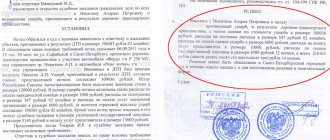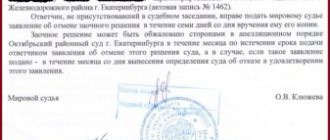Is it possible to get a divorce in absentia, without personal presence?
Termination of marriage in absentia is usually understood as consideration of an application for dissolution of a marriage without the presence of the husband, wife or both spouses at the same time. According to the general rule, divorce in the territorial registry office or in court can only be carried out in the personal presence of the parties. This is done so that each partner has the opportunity to express a personal opinion or declare circumstances prohibiting the termination of the union.
On the other hand, the Russian Constitution guarantees every person the protection of personal rights, including the impossibility of being forced to live in marriage. In order to protect constitutional interests, it is stated that in exceptional situations, divorce is possible without the presence of the parties.
Table No. 1 “Conditions for termination of marriage in absentia”
| Government agency | If you have children under 18 | Without children |
| MARRIAGE REGISTRY | Consideration of the application of one of the spouses without the presence of the other occurs for the following reasons:
| The application must be submitted by both participants, but the absent spouse is required to prepare documents confirming the desire for a remote divorce, without personal presence |
| COURT | Resolution of issues of guardianship/upbringing/financial support of children is carried out in the mutual presence of parents (and children over 10 years old). If one of the parents is absent three times, the decision is made in absentia | The absence of mutual consent to terminate the marriage is the basis for filing a statement of claim in court. The parties may file petitions for divorce in absentia. If the plaintiff/defendant is absent without good reason for 3 summonses to court, the decision is made remotely |
Take the survey and a lawyer will share a free divorce action plan in your case
You might find it useful:
Where to file for divorce
Samples of divorce documents
Divorce lawyer consultation
In what cases is a divorce in absentia acceptable?
Consideration of divorce disputes by civil registry authorities occurs without the presence of one of the participants under the following circumstances:
- mutual consent of the parties to divorce;
- absence of disputes regarding the division of joint property;
- there are no children or they have reached the age of majority;
- submission by the husband/wife of a notarized application for divorce without personal presence.
Without filing a notarial application and without notifying the defendant about the termination of the marriage, it is possible only in case of imprisonment for a criminal offense, recognition as missing or incompetent.
In the future, such a divorce may be refuted by the spouse who has restored legal capacity, or whose place of residence has been revealed.
In the absence of mutual consent to divorce, in the event of additional disputes about children or common property, the divorce is registered in court. You need to know the following about a divorce in absentia:
- You can delegate the authority to represent you in court to a lawyer (documented);
- You can apply to postpone the trial for compelling reasons;
- If a person is repeatedly absent without explaining the reasons, the decision is made in absentia.
Is it possible and how to get a divorce if the child is under 1 year old?
Is it possible to get a divorce without a marriage certificate?
Absentee divorce through the registry office
The general rule for filing a divorce through a government agency involves the husband and wife writing a joint statement. However, the law formally provides for the possibility of getting a divorce through the registry office without the presence of one of the spouses.
There are two options, with or without the application of the second spouse:
With a statement from both spouses
If the spouse is not able to personally visit a government agency (for example, he is on a business trip or undergoing military service), then the second spouse must provide a statement written by the absentee with a notarized signature.
Based on one statement
Divorce is possible only at the request of one of the spouses due to the following circumstances:
- the spouse is missing based on a court decision;
- the spouse is incapacitated;
- the husband or wife is serving a sentence in prison (the term of serving the sentence must be more than three years).
To confirm these circumstances, evidence should be provided (for example, a court decision that has entered into force declaring a citizen incompetent). At the same time, family law provisions provide for the possibility of restoring a marriage. Thus, when a citizen recognized as missing appears, the court cancels the decision to declare him married and the spouses simultaneously submit a joint application to restore the marriage.
Methods for filing for divorce without the presence of a second spouse
The interested spouse has the opportunity to send a petition to terminate the marriage to the registry office in the following ways:
- personally to the authority;
- on the State Services website;
- postal service.
Filing claims in court without the presence of the defendant is available in the following ways:
- Russian Post (function “inventory of attachment”);
- personally;
- through a representative (by notarized power of attorney).
A spouse who does not want to be present during the divorce procedure must contact a notary and prepare:
- written consent to dissolve the marriage;
- a trust letter for the second spouse, allowing you to file an application unilaterally.
The spouse who has given consent for an absentee divorce pays the state fee in the general manner, but the registry office is not obliged to send him a divorce certificate.
Are you tired of reading? We’ll tell you over the phone and answer your questions.
How to file for divorce unilaterally through court?
If the children are still small or the partner is against separation, and the law does not allow ignoring his disagreement, then you will have to write a statement of claim to the court. Of course, the court will still divorce the couple, because it will be impossible to forcibly keep a person in marriage. But in order to protect the interests of children and the priorities of preserving marital unions, the judge will consider all the nuances of the situation, which means the procedure will last a long time.
There is no need for two applications to the court - the claim is filed by one citizen (Plaintiff). He transfers 600 rubles. to pay the duty.
Statement
Plaintiffs write an application for unilateral divorce in court according to the sample.
It indicates the full name of the district of the Magistrates' Court where it will be filed (according to the registration or registration of any spouse), the details of the plaintiff (who decided to divorce) and the defendant (who is being divorced).
The document is entitled “Statement of Claim for Divorce.”
They describe in detail all the circumstances relating to children born during the marriage of citizens:
- does the couple have them?
- how many are there;
- how old are they;
- where they live;
- whether agreement on their future life has been established (who will live with them, who has priority rights, whether the issue of meetings with the second parent has been settled);
- it is possible to simultaneously apply for alimony and indicate whether agreement has been reached on their payments.
The same applies to joint property: you need to indicate whether it exists and whether agreement has been reached on division.
If there are no children, then you need to explain why the administrative procedure is not taking place (through the registry office):
- no consent;
- does not appear at the registry office at the appointed time;
- categorically against divorce;
- it is unknown where he lives (but he was not recognized as missing);
- There is a conflict over the division of material assets.
It will significantly speed things up if you write that the marital relationship has long been terminated, the citizens live separately, do not have a common budget, that is, the family actually no longer exists.
See also:
How to go through the debunking procedure?
The reason that prompted the citizen to write an application for divorce is indicated.
A quicker decision is also facilitated by the indication that all possibilities for saving the marriage have already been exhausted and reconciliation is not possible.
A convenient way to apply for a unilateral divorce is to register it at the State Services and pay the fee there. Then a notification will be received by e-mail or telephone indicating when and where to appear to participate in the consideration of the case.
List of required documents
In addition to the statement of claim, you need: a receipt for the transfer of the fee, original passports and marriage certificates, certificates or passports of children, documents for property (if its division will be considered), certificates of income of the spouses (if the wife simultaneously applies for alimony).
Where to apply?
Usually the application is submitted where the spouses (one of them) live. It doesn’t matter whether he has permanent registration at this address or temporary registration.
Other options are also possible, but you will have to justify why the claim is being filed in this territorial area.
Terms of unilateral divorce
After writing the application, you will also have to wait at least 30 days for the first hearing (or rather more, it depends on the workload of the magistrate).
If there are no disagreements and the spouses have already resolved all the issues peacefully among themselves, then there is a chance to get a divorce the first time.
Any hint of disagreement or even the illusory possibility that the couple will reconcile forces the judge to decide to postpone the procedure for 3 months so that the divorcing couple can think about everything again.
It often happens that a spouse who does not agree with the divorce ignores the meetings. In this situation, at least 3 meetings will be required. He will be invited, his absences will be recorded, and only after that the court will make a decision on divorce without the presence of one of the spouses.
Sometimes, when there are fundamental disagreements on the division of material assets, the judge first makes a divorce order, and then continues to consider property issues.
Procedure for filing an application for divorce in absentia
Divorce proceedings are carried out:
- civil registration authorities;
- district courts;
- justices of the peace.
Universal algorithm for submitting an appeal:
- the emergence of grounds for divorce;
- agreement with the other party;
- collection of required documents;
- preparing an application;
- submission of necessary documents;
- payment of state duty.
If it was not possible to obtain the written consent of the defendant, it is necessary to submit documents confirming the sending of notice of the upcoming divorce process. A receipt of registered mail will be sufficient.
Time limits for a court decision to enter into legal force
Art. 321 of the Civil Procedure Code establishes that after the final verdict is rendered by the judge, the parties have a month to appeal it. If after this period the appeal has not been filed, the decision enters into legal force. From this date the marriage is considered dissolved.
Within 3 days from the date of the decision, the decision is transferred to the registry office for the preparation of a divorce certificate. At this stage, each spouse who wishes to obtain a certificate of divorce must pay 350 rubles of state duty for its production.
Cancellation of a court decision in absentia divorce
The legislation provides for 2 ways to cancel a court decision:
- before entering into legal force;
- after entering into legal force.
During the appeal period
Within 3 days from the date of divorce, each of the participants is sent a copy of the court verdict. Spouses can receive their copy of the document in the judge's office or remotely by mail. Then, within 1 week, an application is prepared to cancel the decision in absentia if the participant does not agree with the verdict.
Question from judicial practice: I received a notification that the court has issued a divorce decree. I did not receive any notices that my wife decided to end the marriage, or any summons to appear in court. Is it possible to appeal a divorce?
Lawyer's answer: The spouse, having decided to end the marriage, is obliged to send her husband a notice of the upcoming divorce with a copy of the statement of claim. If such notice was not received, then procedural requirements were violated and the spouse has the right to appeal the decision.
The second condition is the presence of compelling reasons for absence during the meeting. A court clerk is authorized to issue subpoenas to all participants. Ignoring 3 official calls leads to an absentee decision by the court. If a citizen was absent from his place of residence for good reasons (business trip outside the garrison, illness with inpatient treatment) and the summons was not received, then the judge is obliged to cancel the previously made decision and set a new date for resolving the dispute, when all participants can be present.
Upon expiration of the period for appeal
According to the general rule, it will no longer be possible to cancel a decision made after a month. But there are a number of cases when the defendant has the right to annul a court decision on appeal. These include:
- lack of information about the divorce process;
- failure to receive an accepted verdict;
- violation of the deadlines for sending a court decision before it enters into legal force.
The interested participant must collect a complete package of evidence to restore the appeal period, prepare a statement of claim to the court where the main decision was made. If the judge grants the request and restores the deadline for filing an appeal, then a second appeal will be made, but to a higher authority.
Possible difficulties
The most common difficulty is ignorance on the part of the defendant: he does not come to court hearings.
When the defendant really cannot be in court, but the spouses have already reached a fundamental agreement on key issues, the solution is simple: the absentee either issues a power of attorney to his representative, or directly applies in writing to the judge with a request to consider the case without him. This method (divorce without the presence of a spouse with a power of attorney) is also a good solution if the divorcees are in a quarrel and it is morally difficult for them to see each other.
If the defendant does not appear in court, expressing his disagreement, wanting to delay the process, put pressure on the spouse, cause him pain, then the divorce will still take place, but the proceedings will last 4 months or more (depending on the workload of the magistrate).
It happens that the plaintiff himself is not able to appear on the appointed day (illness, business trip, work). Then he can also send a representative in his place with a power of attorney or declare a postponement of the hearing date, or directly at the previous meeting ask for permission to represent his interests further by a third party (decision at the discretion of the judge).
A citizen can, at any time before the court makes a decision, withdraw the statement of claim at his own request without any consequences for himself. But you need to understand that you won’t be able to submit the same application again. If the spouses do not come to reconciliation, then the other spouse will have to file the claim a second time, or they will have to prove that there are other grounds for divorce (not those indicated in the first application).
Often, by the time the divorce is filed, the spouses have already separated, and the plaintiff may not know where the defendant is actually located, he does not give news of himself and does not participate in the life of the family. Summons will be sent to your registered address. To speed up the process, it is better to think through all the ways to notify the defendant about the date of the hearing (call at work, write in instant messengers).
See also:
Breakup virus: divorce during forced quarantine
The court must hear the arguments of the defendant, who appeared in court but expressed a categorical refusal to get a divorce, and must take them into account. Most likely, a conciliation period will be appointed. But there is a chance to obtain a divorce from the court in absentia the first time, by providing documentary evidence of abuse towards your spouse or children, long-term separation, actual absence of family relations and child care.
An obstacle may also be the absence of the original marriage certificate (the application will not be accepted without it): it is lost or someone is holding it (spouse, relatives). This will not become a big difficulty: quite quickly a duplicate will be made in the registry office archive, which will be presented to the court.
Lawyer's answers to frequently asked questions
I received a divorce decree in absentia, which comes into force on the 17th, can I purchase real estate before the 17th and will my husband be able to claim it?
The Civil Code states that property acquired during marriage will be considered joint and subject to division during divorce. Marriage relations are considered terminated:
- after making an entry in the civil registration book (divorce through the registry office);
- after the court decision enters into legal force (in the current example, on the 17th).
The spouse will not be able to purchase real estate, since the consent of the official spouse is required to participate in the transaction. You will be able to complete the purchase only after the 17th.
If a car was purchased after a court decision in absentia and it entered into legal force, but the defendant subsequently cancels the court decision, will he have rights to the car?
The car will remain the individual property of the spouse who made the purchase, since the partners were divorced at the time of purchase.
Cancellation of a default judgment in accordance with the Code of Civil Procedure of the Russian Federation
A default judgment is made in cases where the defendant is properly notified of the hearing of the case, but does not appear at the court hearing.
If the court enters a default judgment on a divorce, the defendant can attempt to have the divorce annulled by filing a motion to vacate the default judgment.
A default judgment can be canceled within 7 days from the date the defendant receives a copy of it.
When can a default judgment be overturned?
This is the main trick that the defendant can use. If he did not receive a copy of the document on the termination of the marriage for good reasons, then the cancellation period can be restored!
What are considered valid reasons for reinstating the deadline:
- Serious illness, hospital stay;
- Being on a business trip, vacation;
- Postal service failure.
The following will not be recognized as valid reasons:
- Change of address without notifying the court;
- Failure to appear at the post office for collection;
- Failure to reside at the specified address.
The court considers the period of 7 days from service to have expired from the date on which the decision was either received or when the letter with the decision was returned to the court.
The defendant can try to file an application to cancel the default divorce decree and there is every chance of annulling the divorce by starting a new trial.
Procedure for annulment of divorce in absentia
Stages of reversing a default verdict and annulment of divorce:
- Drawing up an application for annulment of divorce and cancellation of the decision;
- Submitting an application to the court along with a petition to restore the deadline. If you want to;
- Appearing in court to consider the application, if a hearing is scheduled.
Based on the results of consideration of such an application, the court will make one of two determinations:
- Refuse to cancel the default judgment;
- Will cancel the decision and resume the proceedings.
An application to cancel a default judgment is submitted to the same court that made the decision. The key argument in the application is the rationale that the absence of the defendant significantly influenced the outcome of the decision. When it comes to divorces, it is best to focus on the desire to get a period of reconciliation with the initiating spouse.









